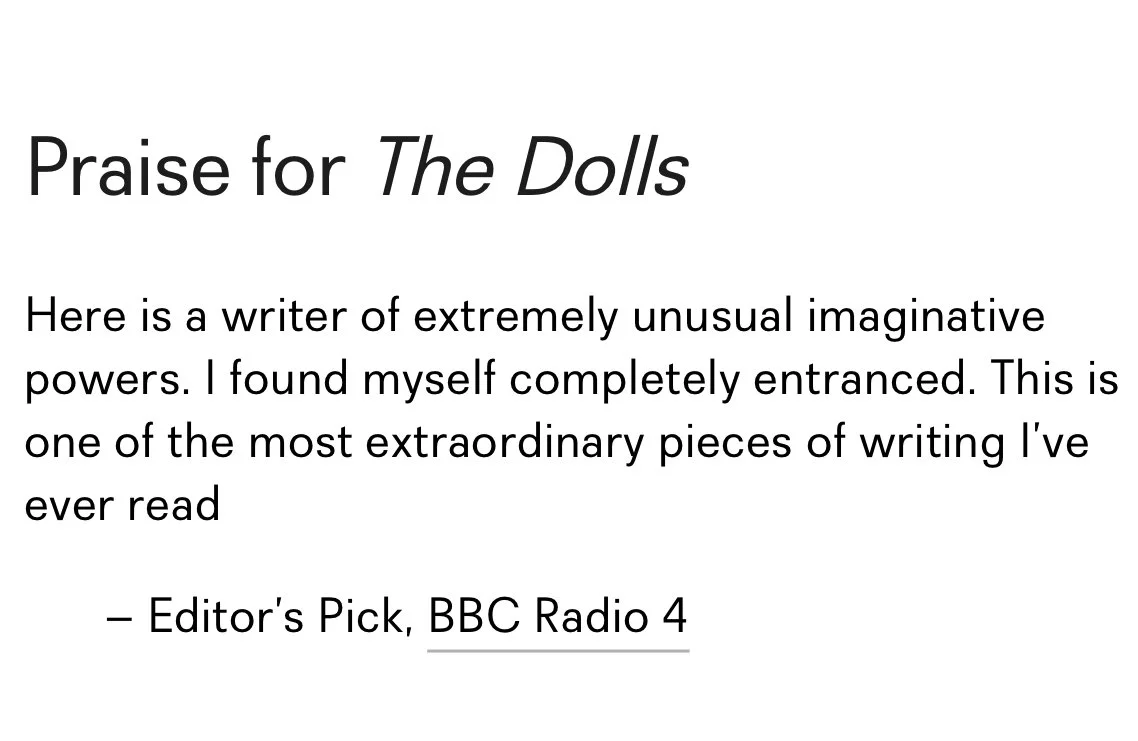Books by Ursula Scavenius
The Dolls
Illustrator: Laura Silke
Translator: Jennifer Russell
Editor: Denise Rose Hansen
@lolli editions
The Dolls is a collection of four stories about states of emergency and human powerlessness. Although the book touches on themes such as neo-fascism, the demonization of others—including pandemics and the fear of contagion—climate crisis, and trauma, it insists on never being explanatory or overtly political. Instead, it reports from a distorted world and its human conditions and atmospheres.
Ursula Scavenius’s The Dolls is a chilling and sensuous collection of four interconnected stories from a world both fantastically strange and gruellingly familiar, where isolation, ruin, prejudice, and misinformation rise in a fugue of displaced families yearning to belong. Characters are haunted by vague illnesses, political breakdown, and environmental collapse: siblings travel across borders with a coffin; a woman hides with a man whose role as savior or threat remains unclear; a girl observes sinister acts from a wheelchair while her sister refuses to leave the basement. Nothing can be said to be true anymore—anything may be propaganda.
Drawing on influences from Kafka and Strindberg to Béla Tarr and Hieronymus Bosch, Scavenius creates dreamlike, claustrophobic spaces charged with both intimacy and menace. In Jennifer Russell’s translation, the language is lyrical, sharp, and disturbing.
Bernur writes that Scavenius “strengthens her position in the Nordic region as one of the few genuinely innovative prose writers,” while BBC Radio 4 called The Dolls “one of the most extraordinary pieces of writing I’ve ever read.” The Irish Times praised its “rigorous inventiveness,” Asymptote its “peculiar and gritty prose,” and POV International its grey-toned universe of “ethical and moral degradation… supremely well-written.”
Dukkerne
Illustrator: Kasper Vang & Signe Krab Nymann
Redaktør: Sofie Anker-Møller Damgaard
Forlag: Basilisk
FJER - TRE FORTÆLLINGER
Ursula Scavenius’s debut collection Fjer (2015, new edition 2017) is a bold and sensuous exploration of human vulnerability and transformation through three striking stories set in both realistic and post-apocalyptic worlds. The narratives—ranging from a Danish exile writer’s fraught relationship in “Majinski,” to a couple trapped in a flooded landscape under a surreal second moon in “Luna Secunda,” and a grieving father witnessing his son’s metamorphosis in “Fugleland”—combine vivid, sensory language with deep psychological insight. As Information’s Solveig Daugaard notes, “It is not a comfortable book… beautiful in all its mature stubbornness,” while the prose evokes a “Central European timelessness.”
Fjer has been widely acclaimed for its originality and poetic power, described as “harsh,” “disturbingly beautiful,” and marking “an original Danish literary voice.” The collection earned Ursula Scavenius Denmark’s most prestigious debut prize, the Bodil and Jørgen Munch Petersen Cultural Award (2016), and was nominated for several other honors including the Montanaprisen and the Edvard P. Prize in both 2016 and 2021, and the book was also sold to Sweden (Modernista, 2017) and parts of it translated into English by Jennifer Russell, that won the Gulf Coast Prize in Translation for it. From 2020 to 2023, she received a three-year working grant from the Danish Arts Foundation.
In 2021, the theatrical adaptation Luna Secunda, based on Fjer, won the Reumert Award for Digital Theater Production of the Year. The jury praised the production for its “insatiable curiosity” and ability to “bring the global nightmare of the climate crisis into a fever dream of disturbing waves of doom,” calling it “beautiful and disgusting—and insanely live.”
The reviews see Scavenius as a powerful new voice in contemporary Danish literature, offering readers a challenging, immersive experience that probes trauma, body, and psyche with poetic rigor and emotional intensity.
Fjädrar
Illustrator: Ivan Micic
Oversætter: Henrik Petersen
Forlag: Modernista, Sverige







